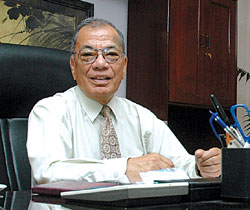|
|
Vijay Gajananda Vaidya, chairman of United Traders Syndicate, started his business career as an exclusive dealer for Toyota 40 years ago. Vaidya spoke with Nepali Times about the importance of first impressions and how to build a career of entrepreneurship.
Nepali Times: How did you enter into business and start working with Toyota?
Vijay Gajananda Vaidya: Before I started working with Toyota, I worked for other organisations and got a lot of good experience. The six years I worked at USAID were especially great because I got to travel a lot. On the flip side, it also made me realise that I did not want to work for anyone. After I returned from the US, I went to meet the Toyota people in Japan. They asked me at our first meeting how many cars I could sell in a year, because in the seven years prior to that, just seven Toyota cars had been sold in Nepal. I was offended and walked out, but we did make a deal later.
How did you sell yourself, having had no business experience?
It's all about making a good impression. I couldn't afford it, but I stayed in a five-star hotel when I was there. I made them pursue me. I did all this to impress them, and it worked. When we signed the deal, I organised a big party. Nepal's ambassador to Japan asked me why I was spending all this money, and I remember telling him that all this would help me build connections. It did help in the long run.
So how well have you done?
I suggested six, they wanted 500, and after a lot of discussion we agreed on 12. That year I sold 96. Now we sell more than 500 cars a year.
When I came back from the US I had $700. I also brought back a gramophone, which I sold for another $300. Today I have a lot more than other people. But the support I have from my employees means much more to me than my property. Over 7,000 people work for me directly. If you include seasonal workers, it's over 9,000.
What's your outlook on the agriculture sector?
There are lots of possibilities in Nepal in agriculture. If we develop workers' skills and produce goods that the modern market demands, the results will be very good. When I saw that sweet peas were good business in Japan, I leased 10 hectares in Palung and started cultivating sweet peas. They sold for $24 per kg in Japan.
When I saw that we weren't really cashing in on agriculture even when the business environment was good, I decided to give it a shot. I was attracted to tea because the gardens would make the hills green and because the industry is labour intensive. I got a tea expert for advice, sent the soil to be tested in India and Germany, heard positive news, and decided to start working with the local tea farmers there who were slowly getting disillusioned with the business.
What changes have you seen in the government and private sectors since you started out?
There's more work being done in both areas. The pace is slow though, and the foundations could be stronger. Even the private sector has not grown as much as we might have expected.
Nepali businesses still do not understand discipline and ethics. In other countries the business and corporate sectors understand that they are taxed heavily. The private sector here is trying to earn more money by evading taxes. I know people in government and I could have earned a lot via commissions, people from the government have approached me with deals that involved selling goods for more than their actual worth. I could have been the richest person in Nepal.
Are you saying you've never bribed anyone?
I've never paid anyone to work illegally. My sons and the people in my organisation will not bribe anyone because when you pay someone, the price of that good automatically rises. When the Maoists asked for money I refused. I'm generous and have gifted tvs and cars to those who've done good work for me, but I have never bribed anyone.



